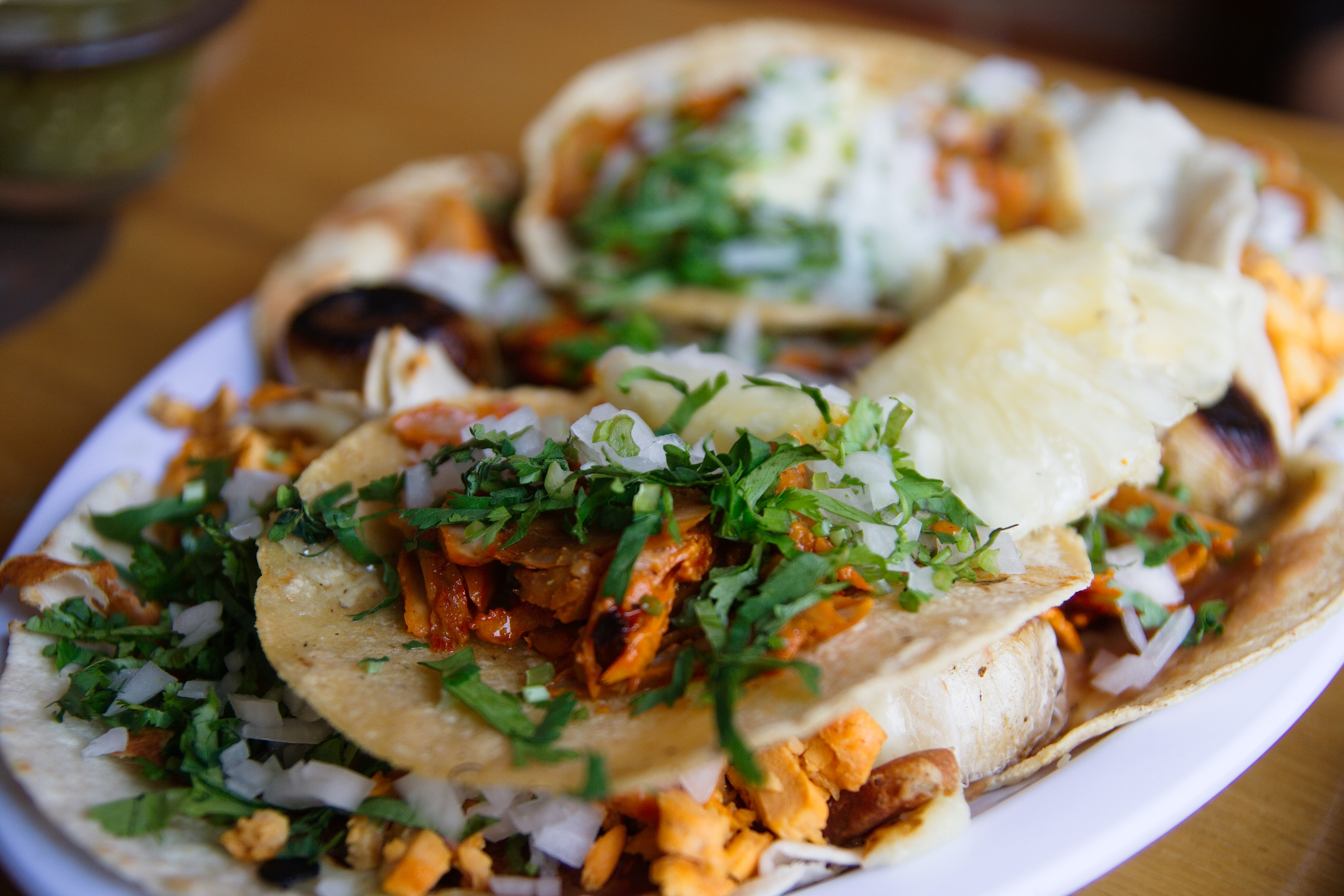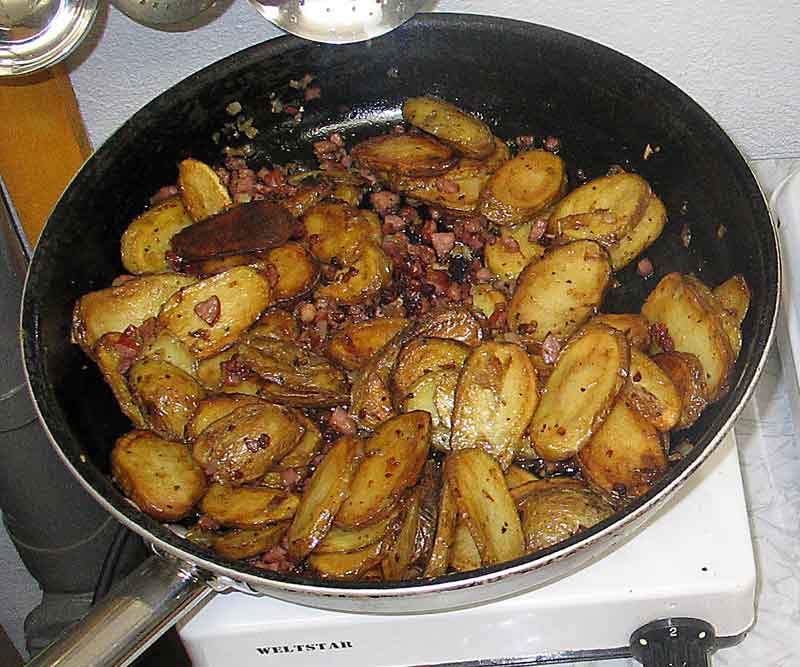|
Mexican-American Cuisine
Mexican-American cuisine is the cuisine of Mexican Americans and their descendants, who have modified Mexican cuisine under the influence of American culture and immigration patterns of Mexicans to the United States. What many recognize as Mexican cuisine is the product of a storied fusion of cultures and flavors. Its culinary adaptability has impacted its spread and popularity on a global scale and its presence in the United States is no exception. Culinary staples like tortillas, salsa, chips, chili, burritos, and tacos help to formulate many Americans' notions of Mexican food. Due in part to big business, immigration, and widespread likability, Mexican food and dishes have largely become regular constituents in American homes. While some of these popular iterations of Mexican food are far removed from their Mexican origins, they make up a large portion of the diets of many Americans. Additionally, more traditional Mexican cuisine has become more common in the United Stat ... [...More Info...] [...Related Items...] OR: [Wikipedia] [Google] [Baidu] |
Tacos Veganos En Aguascalientes 02
A taco (, , ) is a traditional Mexican food consisting of a small hand-sized corn- or wheat-based tortilla topped with a filling. The tortilla is then folded around the filling and eaten by hand. A taco can be made with a variety of fillings, including beef, pork, chicken, seafood, beans, vegetables, and cheese, allowing for great versatility and variety. They are often garnished with various condiments, such as salsa, guacamole, or sour cream, and vegetables, such as lettuce, onion, tomatoes, and chiles. Tacos are a common form of antojitos, or Mexican street food, which have spread around the world. Tacos can be contrasted with similar foods such as burritos, which are often much larger and rolled rather than folded; taquitos, which are rolled and fried; or chalupas/ tostadas, in which the tortilla is fried before filling. Etymology The origins of the taco are not precisely known, and etymologies for the culinary usage of the word are generally theoretical. ''Taco'' in ... [...More Info...] [...Related Items...] OR: [Wikipedia] [Google] [Baidu] |
Tomatillo
The tomatillo (''Physalis philadelphica'' and ''Physalis ixocarpa''), also known as the Mexican husk tomato, is a plant of the nightshade family bearing small, spherical, and green or green-purple fruit of the same name. Tomatillos originated in Mexico and were cultivated in the pre-Columbian era. A staple of Mexican cuisine, they are eaten raw and cooked in a variety of dishes, particularly salsa verde. The tomatillo is a perennial plant but is generally grown for agriculture each year as if it were an annual. Names The tomatillo (from Nahuatl, ') is also known as husk tomato, Mexican groundcherry, large-flowered tomatillo, or Mexican husk tomato. Some of these names, however, can also refer to other species in the genus '' Physalis''. Other names are Mexican green tomato and miltomate. In Spanish, it is called ''tomate de cáscara'' (husk tomato), ''tomate de fresadilla'' (little strawberry tomato), ''tomate milpero'' (field tomato), ''tomate verde'' (green tomato), ''t ... [...More Info...] [...Related Items...] OR: [Wikipedia] [Google] [Baidu] |
Texas
Texas (, ; Spanish language, Spanish: ''Texas'', ''Tejas'') is a state in the South Central United States, South Central region of the United States. At 268,596 square miles (695,662 km2), and with more than 29.1 million residents in 2020, it is the second-largest U.S. state by both List of U.S. states and territories by area, area (after Alaska) and List of U.S. states and territories by population, population (after California). Texas shares borders with the states of Louisiana to the east, Arkansas to the northeast, Oklahoma to the north, New Mexico to the west, and the Mexico, Mexican States of Mexico, states of Chihuahua (state), Chihuahua, Coahuila, Nuevo León, and Tamaulipas to the south and southwest; and has a coastline with the Gulf of Mexico to the southeast. Houston is the List of cities in Texas by population, most populous city in Texas and the List of United States cities by population, fourth-largest in the U.S., while San Antonio is the second most pop ... [...More Info...] [...Related Items...] OR: [Wikipedia] [Google] [Baidu] |
Chili Con Carne (5034005470)
Chili con carne (also spelled chilli con carne or chile con carne and shortened to chili or chilli; ), meaning "chili with meat", is a spicy stew containing chili peppers (sometimes in the form of chili powder), meat (usually beef), tomatoes, and often pinto beans or kidney beans. Other seasonings may include garlic, onions, and cumin. The dish originated in northern Mexico or southern Texas. The types of meat and other ingredients used vary based on geographic and personal tastes. Recipes provoke disputes among aficionados, some of whom insist that the word ''chili'' applies only to the basic dish, without beans and tomatoes. Chili con carne is a common dish for cook-offs, and may be used as a side, garnish, or ingredient in other dishes, such as soups or salsas. Origins and history In writings from 1529, the Franciscan friar Bernardino de Sahagún described chili pepper-seasoned stews being consumed in the Aztec capital, Tenochtitlan, now the location of Mexico City. The u ... [...More Info...] [...Related Items...] OR: [Wikipedia] [Google] [Baidu] |
Spain
, image_flag = Bandera de España.svg , image_coat = Escudo de España (mazonado).svg , national_motto = '' Plus ultra'' ( Latin)(English: "Further Beyond") , national_anthem = (English: "Royal March") , image_map = , map_caption = , image_map2 = , capital = Madrid , coordinates = , largest_city = Madrid , languages_type = Official language , languages = Spanish , ethnic_groups = , ethnic_groups_year = , ethnic_groups_ref = , religion = , religion_ref = , religion_year = 2020 , demonym = , government_type = Unitary parliamentary constitutional monarchy , leader_title1 = Monarch , leader_name1 = Felipe VI , leader_title2 = Prime Minister , leader_name2 = Pedro Sánchez , legislature = ... [...More Info...] [...Related Items...] OR: [Wikipedia] [Google] [Baidu] |
Mexican Revolution
The Mexican Revolution ( es, Revolución Mexicana) was an extended sequence of armed regional conflicts in Mexico from approximately 1910 to 1920. It has been called "the defining event of modern Mexican history". It resulted in the destruction of the Federal Army and its replacement by a revolutionary army, and the transformation of Mexican culture and government. The northern Constitutionalist faction prevailed on the battlefield and drafted the present-day Constitution of Mexico, which aimed to create a strong central government. Revolutionary generals held power from 1920 to 1940. The revolutionary conflict was primarily a civil war, but foreign powers, having important economic and strategic interests in Mexico, figured in the outcome of Mexico's power struggles. The United States played an especially significant role. Although the decades-long regime of President Porfirio Díaz (1876–1911) was increasingly unpopular, there was no foreboding in 1910 that a revoluti ... [...More Info...] [...Related Items...] OR: [Wikipedia] [Google] [Baidu] |
European Cuisine
European cuisine comprises the cuisines of Europe "European Cuisine." . Accessed July 2011. [...More Info...] [...Related Items...] OR: [Wikipedia] [Google] [Baidu] |
Spanish Empire
The Spanish Empire ( es, link=no, Imperio español), also known as the Hispanic Monarchy ( es, link=no, Monarquía Hispánica) or the Catholic Monarchy ( es, link=no, Monarquía Católica) was a colonial empire governed by Spain and its predecessor states between 1492 and 1976. One of the largest empires in history, it was, in conjunction with the Portuguese Empire, the first to usher the European Age of Discovery and achieve a global scale, controlling vast portions of the Americas, territories in Western Europe], Africa, and various islands in Spanish East Indies, Asia and Oceania. It was one of the most powerful empires of the early modern period, becoming the first empire known as " the empire on which the sun never sets", and reached its maximum extent in the 18th century. An important element in the formation of Spain's empire was the dynastic union between Isabella I of Castile and Ferdinand II of Aragon in 1469, known as the Catholic Monarchs, which ... [...More Info...] [...Related Items...] OR: [Wikipedia] [Google] [Baidu] |
Aztecs
The Aztecs () were a Mesoamerican culture that flourished in central Mexico in the post-classic period from 1300 to 1521. The Aztec people included different ethnic groups of central Mexico, particularly those groups who spoke the Nahuatl language and who dominated large parts of Mesoamerica from the 14th to the 16th centuries. Aztec culture was organized into city-states ('' altepetl''), some of which joined to form alliances, political confederations, or empires. The Aztec Empire was a confederation of three city-states established in 1427: Tenochtitlan, city-state of the Mexica or Tenochca; Texcoco; and Tlacopan, previously part of the Tepanec empire, whose dominant power was Azcapotzalco. Although the term Aztecs is often narrowly restricted to the Mexica of Tenochtitlan, it is also broadly used to refer to Nahua polities or peoples of central Mexico in the prehispanic era, as well as the Spanish colonial era (1521–1821). The definitions of Aztec and Aztecs ha ... [...More Info...] [...Related Items...] OR: [Wikipedia] [Google] [Baidu] |
New World
The term ''New World'' is often used to mean the majority of Earth's Western Hemisphere, specifically the Americas."America." ''The Oxford Companion to the English Language'' (). McArthur, Tom, ed., 1992. New York: Oxford University Press, p. 33: "[16c: from the feminine of ''Americus'', the Latinized first name of the explorer Amerigo Vespucci (1454–1512). The name ''America'' first appeared on a map in 1507 by the German cartographer Martin Waldseemüller, referring to the area now called Brazil]. Since the 16c, a name of the western hemisphere, often in the plural ''Americas'' and more or less synonymous with ''the New World''. Since the 18c, a name of the United States of America. The second sense is now primary in English: ... However, the term is open to uncertainties: ..." The term gained prominence in the early 16th century, during Europe's Age of Discovery, shortly after the Italian explorer Amerigo Vespucci concluded that America (now often called ''th ... [...More Info...] [...Related Items...] OR: [Wikipedia] [Google] [Baidu] |
Conquistador
Conquistadors (, ) or conquistadores (, ; meaning 'conquerors') were the explorer-soldiers of the Spanish Empire, Spanish and Portuguese Empires of the 15th and 16th centuries. During the Age of Discovery, conquistadors sailed beyond Europe to the Americas, Oceania, Africa, and Asia, Colonization, colonizing and opening trade routes. They brought much of the Americas under the dominion of Spain and Portugal. After arrival in the West Indies in 1492, the Spanish, usually led by Hidalgo (nobility), hidalgos from the west and south of Spain, began building an American empire in the Caribbean using islands such as Captaincy General of Santo Domingo, Hispaniola, Captaincy General of Cuba, Cuba, and Captaincy General of Puerto Rico, Puerto Rico as bases. From 1519 to 1521, Hernán Cortés waged a Spanish conquest of the Aztec Empire, campaign against the Aztec Empire, ruled by Moctezuma II. From the territories of the Aztec Empire, conquistadors expanded Spanish rule to northern Cent ... [...More Info...] [...Related Items...] OR: [Wikipedia] [Google] [Baidu] |








